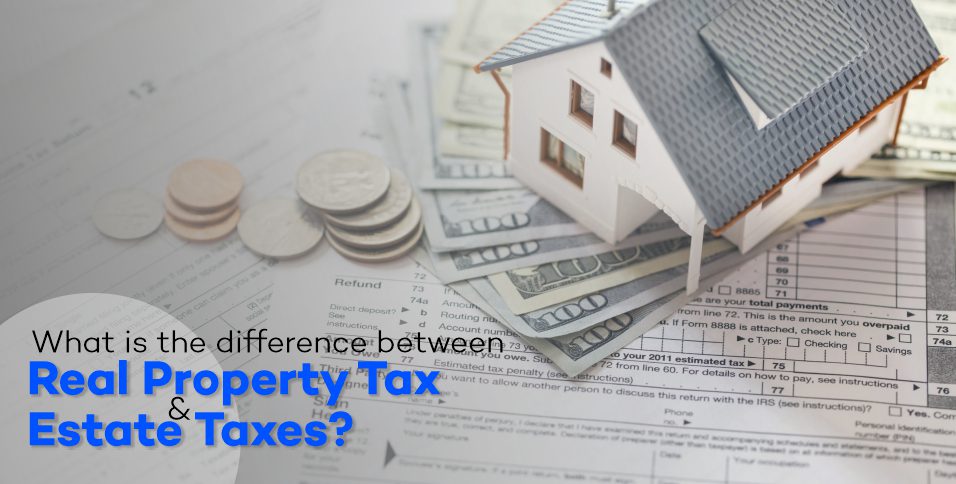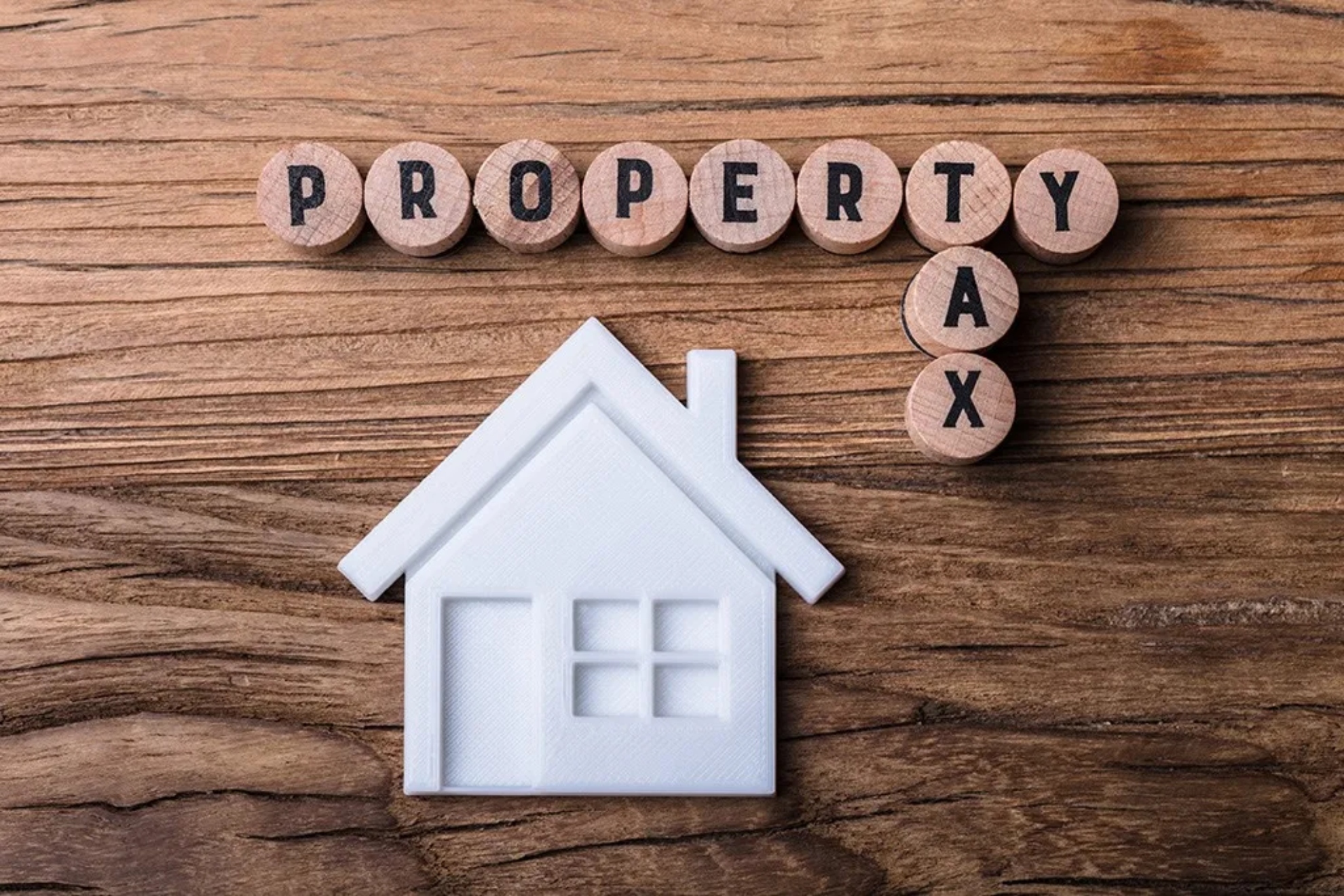Is Real Estate Tax The Same As Property Tax? - Find Out Here!
Unravel the mystery: Is Real Estate Tax the same as Property Tax? We clear the confusion & guide you through tax terms like a pro!
Author:Gordon DickersonReviewer:Habiba AshtonJan 19, 20241K Shares28.2K Views

If you are a homeowner, you probably know about real estate taxes, which are sometimes referred to as property taxes as these terms are often used interchangeably. However, it's important to note that these two taxes are not necessarily identical, a distinction that many people may overlook.
Is real estate tax the same as property tax?, and how do they distinguish themselves? The process of computing your taxes might seem daunting, yet it remains crucial. Whether you own a home or are engaged in property investment, the precise calculation of your real estate taxes plays a pivotal role in comprehending your financial obligations. This guide aims to clarify any distinctions between real estate taxes and property taxes, providing comprehensive insights into the calculation process.
Defining Real Estate Taxes And Property Taxes
Real Estate Taxes
Real estate taxes essentially equate to property taxes, imposed by state and local governments to generate revenue. The calculation of real estate taxes often relies on property value, with higher-value properties generally incurring higher tax amounts. It's useful to consider real estate taxes as a subset of the broader category of property taxes. Before delving into distinctions, let's first define property taxes and then explore any nuances between the two.
Property Taxes
Property taxes are imposed on both real and personal property. Personal property, also known as tangible property, encompasses items like cars, boats, and trailers.
Taxes on real property are determined by the property's value and the accompanying land. Additional structures, such as detached garages and mother-in-law units, contribute to the overall assessed value.
It's important to highlight that property taxes are not standardized across states; rather, they are determined and evaluated by local and municipal governments, leading to regional variations. Property taxes are mandatory, mandated by law, and property owners are obliged to fulfill this obligation annually. However, the specific rate they must pay hinges on the local government's assessment of their property's value.
Now, you might be curious about the utilization of these tax funds. Local governments allocate property taxes to finance public service initiatives, such as road repairs, construction of new schools, wildfire protection, snow removal, and more. In essence, property taxes serve as a crucial means for governments to enhance and sustain local infrastructure.
Distinguishing Real Estate Taxes From Property Taxes
The terms real estate taxes and property taxes are frequently used interchangeably, and this is accurate to a certain extent. However, strictly speaking, property taxes encompass both real estate property and personal property. Real estate taxes specifically pertain to taxes assessed based on the value of residential or commercial property. For instance, real estate taxes might cover levies on a condo, house, or apartment building. In contrast, property taxes encompass these and also include taxes on personal property, such as boats, cars, or other vehicles.
Reasons Real Estate Taxes And Property Taxes Are Distinct
Real estate taxes and property taxes differ both in their calculation methods and the amount owed. Real estate taxes are generally higher than personal property taxes. Personal property taxes, such as those on car registrations, typically entail fixed costs based on the type of asset. For instance, in Colorado, registering a passenger car may cost $75. Conversely, a single-family home valued at $500,000 in Colorado could incur approximately $2,600 in real estate property taxes.
This disparity gains significance during tax season, as property taxes can be eligible for deductions. If substantial amounts are paid in real estate property taxes, it can have a substantial impact on the overall amount owed.
Calculating Real Estate Tax
Calculating real estate tax involves considering three primary factors: the property's value, the assessment rate, and the tax rate. Both the assessment rate and tax rate are established by state and local authorities. Examining the example above, in Denver County, the assessment rate is 7.15 percent, and the tax rate is approximately 0.074 for every $1 of assessed value.
If you possess a home valued at $500,000, you can use the following formula to compute the real estate tax:
500,000 X 0.0715 X 0.0742 = $2652 For a more comprehensive understanding of property tax calculations, continue reading.
Computing Property Tax
Property tax assessment methods vary across states and even among municipalities. The approach one city adopts for tax assessment might differ from that of its neighboring city. Nevertheless, there are general procedures to estimate property taxes:
- Determine the assessed value of the property in question.
- Calculate the true value by adding the land value and any subsequent improvements.
- Consult the local tax assessor to understand the applicable tax rate in the area.
- Consider any additional taxes imposed by subsequent local agencies.
- Sum up all taxes identified in steps three and four.
- Multiply the known taxes by the property value, accounting for both the land and improvements.
To determine your property tax rate, the crucial first step is establishing the current market value of your property. While you might have a general idea of your home's worth, it's the figure assessed by the tax assessor that holds significance. Therefore, it's advisable to consult with them for an accurate evaluation.
Avoid relying solely on any previous assessments you may have received. As noted by Realtor.com, tax assessments occur "every time a property is sold, bought, built, or renovated by examining the permits and paperwork filed with the local municipality." To obtain the most recent and relevant figure based on your property's current value, you can check your local tax assessor's website or contact them directly.
After determining your property's present market value, the next step is to obtain the mill levy, which refers to your local real estate tax rate. This rate tends to be higher in upscale neighborhoods offering enhanced amenities like well-maintained roads and quality schools. You can locate the mill levy on your local tax assessor's website.
Once you have both figures in hand, the calculation is straightforward—just multiply your home's assessed value by the mill levy. The outcome will represent the annual amount of property taxes you are required to pay.
Timeframe For Property Tax Payments
The duration within which you must pay property taxes is contingent upon the tax collection schedule established by your local government. Many homeowners experience the integration of property taxes into their mortgage payments, with these taxes being paid on a monthly basis.
However, collection schedules for property taxes differ from state to state. Typically, property taxes are invoiced annually, but the allotted time for payment can vary. Some states may offer the flexibility to divide payments into several installments. It's important to note that late payments beyond a specified number of days after the final installment due date may incur delinquency or penalty fees.
Time Within Property Taxes Must Be Paid
The deadline for property tax payments varies depending on the property's location. It is the responsibility of the taxpayer to obtain their tax bill and ensure timely payments. Information regarding property tax due dates can be obtained from the local tax assessor's website.
As an illustration, the San Diego County tax collection websiteoutlines a schedule for installment payments. The initial installment is required by November 1 and considered late after December 10. The second installment is due by February 1 and considered late after April 10. This indicates that taxpayers have a generous timeframe to make either installment payment, and they also have the option to pay both installments when the first one is due.
Deducting Property Taxes
While property taxes remain deductible, the Tax Cuts and Jobs Act of 2017 introduced a limit on the deductible amount. As you consider the potential impact of any changes under the new administration, it's important to note that there have been no alterations thus far. As per Quicken Loans, the deduction is capped at $10,000 for those married filing jointly and at $5,000 for those filing separately or for individuals. It is advisable to seek advice from a tax professional for the most accurate information.
Property Taxes Included In Mortgage Payments
Frequently, property taxes are incorporated into mortgage payments. Lenders typically bundle property taxes into monthly mortgage payments as a protective measure. In the event that the homeowner fails to make both mortgage and property tax payments, the lender retains the right to foreclose on the property. This arrangement enables lenders to safeguard themselves from potential payment delinquencies.
Calculator For Property Taxes
Once more, there is no single formula for computing property taxes that can yield the precise annual amount you should anticipate paying. The considerable differences from state to state and even city to city make a universal equation unfeasible. Each locality will have its unique tax rate to consider. However, SmartAssetoffers a property tax calculator that can offer you a reasonable estimate
Tax Tips For Business Owners In Real Estate
A crucial step for real estate investors in gearing up for tax season is getting acquainted with the tax filing procedures. This involves understanding common terminology and learning how to navigate the filing process. The infographic below provides valuable tax tips for business owners in the real estate sector:
Engage The Services Of A CPA
A certified public accountant (CPA) is a qualified financial consultant who can offer valuable assistance during the tax season. CPAs offer a range of services, including investment planning and acquisitions. It is advisable to choose a CPA with expertise in real estate, as they possess a deeper understanding of the applicable forms and deductions.
While there are fees associated with working with a CPA, these costs are typically reasonable when compared to the potential long-term savings. Professionals in this field assist in ensuring accurate tax filing, optimizing your returns.
Channel Profits Into Additional Passive Income Property Investments
Considering the advantages of real estate investment, it is logical to expand your portfolio gradually. A effective strategy for achieving this is to reinvest earnings into additional passive income properties, creating a source of long-term cash flow. Engaging in passive income properties allows you to leverage benefits such as depreciation deductions and consistent income.
Explore Individual Retirement Accounts (IRAs)
While engaging in direct real estate investment provides numerous tax benefits, it's essential not to overlook the additional advantages that come with consistent contributions to a self-directed IRA. A self-directed IRA empowers individuals to make their investment decisions, enabling them to invest in various assets, including stocks, bonds, and real estate. Investments in IRAs often enjoy tax-free or tax-deferred growth, though the funds are generally inaccessible until investors reach retirement age.
Establish Orderliness
Being well-organized is a crucial characteristic for any successful entrepreneur, particularly when tax season approaches. Whether you operate from a home office or a dedicated workspace, concentrate on creating an environment that fosters productivity for both you and your team. A well-organized office enhances efficiency and streamlines the filing process during tax season.
Distinguish Between Short-Term And Long-Term Investments
In anticipation of tax season, begin by categorizing your investments into short and long-term holdings. Short-term investments are those held for one year or less, while long-term investments extend beyond that timeframe.
For instance, activities like wholesaling, prehabbing, and flipping usually fall into the category of short-term investments, whereas buy-and-hold properties are typically considered long-term. This distinction becomes significant when determining the applicable tax rates for each investment. Consult with your CPA to guide you in identifying the suitable entity structures for your specific investments.
Embrace Digital Solutions
The common image associated with tax season involves business owners sifting through chaotic paper receipts and files. Evade this scenario by adopting digital tools to streamline your paperwork. Applications like MileIQ, Evernote, and Mint prove valuable for bookkeeping, enabling users to categorize expenses and add notes to specific entries. Maintaining a digital organizational system throughout the year can not only save time and money but also alleviate stress when tax season approaches.
Frequently Asked Questions - Is Real Estate Tax The Same As Property Tax
Who Pays The Most Taxes?
High-Income Taxpayers Paid the Majority of Federal Income Taxes. In 2020, the bottom half of taxpayers earned 10.2 percent of total AGI and paid 2.3 percent of all federal individual income taxes. The top 1 percent earned 22.2 percent of total AGI and paid 42.3 percent of all federal income taxes.
Which State Has The Highest And Cheapest Property Tax?
New Jersey holds the record for the highest property tax among all states, with an average effective property tax rate of 2.21%. Illinois ranks as the second-highest with an average rate of 2.05%. Hawaii claims the title of the state with the most economical property tax, boasting a rate of 0.27%. Following Hawaii is Alabama, where the property tax rate stands at 0.39%.
Who Pays More Tax UK Or USA?
UK taxes are generally higher than in the US. Depending on where you live and how much you earn, UK personal income taxes can reach rates as high as 45% — significantly higher than the top US income tax rate of 37%. UK capital gains tax rates, meanwhile, top out at 28% while US capital gains tax rates max out at 20%.
Conclusion
So, is real estate tax the same as property tax? Not entirely. Real estate tax falls under the broader umbrella of property taxes, specifically targeting land and permanent structures like houses. Meanwhile, property taxes can also encompass movable assets like cars and boats, depending on your location. Understanding this distinction empowers you to navigate homeownership and tax obligations with confidence. Remember, both taxes contribute to funding essential public services, so paying them on time is crucial. Want to delve deeper? Explore your local tax authority's website or consult a financial advisor for personalized guidance. With knowledge as your weapon, you can conquer any tax labyrinth!

Gordon Dickerson
Author

Habiba Ashton
Reviewer
Latest Articles
Popular Articles

